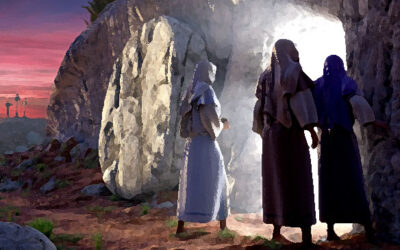That’s Paul’s way of saying it doesn’t matter, and God doesn’t care, about your rules and customs surrounding days of the week or year. Whatever you do, or don’t do, do it as unto the Lord.
But what ought to really excite us whenever we contemplate the birth of Jesus is the fact that “the Word became flesh.” This is the most remarkable event in the history of God’s dealings with mankind. The implications are staggering. Most interesting is the fact that John declares this significant truth – that God became a man – without even referencing His birth in Bethlehem. Those details are provided by other Gospel writers, but for John, the spiritual import of this momentous occasion transcended the physical, geographic, historical, and political context in which it took place.
That John calls Jesus “the Word” makes it all the more intriguing. This description is uniquely John’s. It covers the birth of Jesus as well as His second coming, when John sees Him returning with the armies of heaven and declares His name to be “the Word of God” (Rev. 19:13). Here is One Who so perfectly knows and fulfills the will of His Father that He is synonymous with it. The Word of God is, of course, the Will of God, in all of its expressions – the highest and most perfect expression of all being Christ the Living Word. This Word became flesh and dwelt among us!
I find three notable truths about this extraordinary event. When “the Word becomes flesh” then…
1. Written Commandments Became Living Truths. We needed the Word to become flesh so we could truly see and understand what it means to walk with God. Sometimes we read something and fail to grasp its meaning – or worse, we take away a meaning that the writer never intended. Most of the time that’s not the end of the world, but when it comes to reading and interpreting Scripture, religious people have an uncanny knack for twisting the Scriptures to fit their own funny ideas. This was the state of Judaism when the Word became flesh (and it is even more so today). God sent the Living Word to fulfill, clarify, explain, and demonstrate the Written Word so we can be completely without excuse. We cannot plead ignorance, nor can we blame the preacher or the teacher for not showing us the Truth, because the Word was made flesh and lived among us. The Written Word can be misinterpreted, the Spoken Word can be heard and forgotten, but Jesus, the Word that was made flesh, reveals the glory of God in all grace and truth. He did not just teach the correct meaning: He demonstrated it. This brings us to the second truth…
2. Spiritual Platitudes Became Practical Examples. Jesus accused the religious leaders of His day of “making the word of God of no effect through your tradition which you have handed down” (Mark 7:13). They interpreted the Scriptures the way lawyers interpret a legal ruling, looking for caveats, holes, and ways to avoid doing what the Law expressly told them to do. Jesus exposed the hypocrisy of these traditions and continues to do so today. I am afraid that too many believers (if they know the Bible at all) merely use the Word of God to debate theology, to argue for their beliefs, or to justify their position on a thousand minor points – offering no fruit, no practical good example, no deeds to support their many words. The Bible, for them, is a sword for chopping up other people instead of a weapon of mass instruction to set captives free. I am so thankful that when the Word became flesh He did not just teach spiritual truth, but gave us a practical example to follow: “For to this you were called, because Christ also suffered for us, leaving us an example, that you should follow His steps” (1 Pet. 2:21). Hearers (and preachers) of the Word are many; doers of the Word are few.
3. Hearts of Stone Became Hearts of Flesh. Formerly, the Word of God was engraved upon tablets of stone, and letter upon scrolls with ink. It could be read and studied, but precious few could follow it. All that has changed. We still have the written Word, but now we have the Living Word as well. This Word that become flesh and dwelt AMONG us can now live WITHIN us! “Clearly you are an epistle of Christ, ministered by us, written not with ink but by the Spirit of the living God, not on tablets of stone but on tablets of flesh, that is, of the heart” (2 Cor. 3:3). It is possible to witness and participate in the birth of Christ every day by simply taking in His Word (spoken, written and living) and allowing the Holy Spirit to write His truth upon our hearts.
But even this is not enough. To truly make the Word flesh (i.e., living) we have to put into practice the things that Jesus says to do. James, the younger brother of Jesus, said it best when he wrote, “Faith by itself, if it does not have works, is dead.” (James 2:17). The Word becomes flesh, not when we celebrate the birth of Jesus, and not even when we listen to or agree with His teachings, but when we do what He says to do. Here is the promise: “He who has My commandments and keeps them, it is he who loves Me. And he who loves Me will be loved by My Father, and I will love him and manifest Myself to him” (John 14:21). What a radical concept! The Word becomes flesh (is manifest or revealed to us experientially) when we do what Jesus says to do. He is the Word of God.
I pray each day for the Kingdom to come and the Will of God to be done “on earth, as it is in heaven,” because, “Forever, O LORD, Your word is settled in heaven” (Ps. 119:89). Here on earth things are still unsettled. But our confidence is that God will perfect what He has begun in me, in you, in every disciple, in the Ekklesia, and in all Creation.
“So shall My word be that goes forth from My mouth; It shall not return to Me void, but it shall accomplish what I please, and it shall prosper in the thing for which I sent it” (Isa. 55:11). Amen. Even so, come Lord Jesus – may the Word become flesh and dwell among us anew, that all the world will see the glory of God in the face of Jesus Christ.












